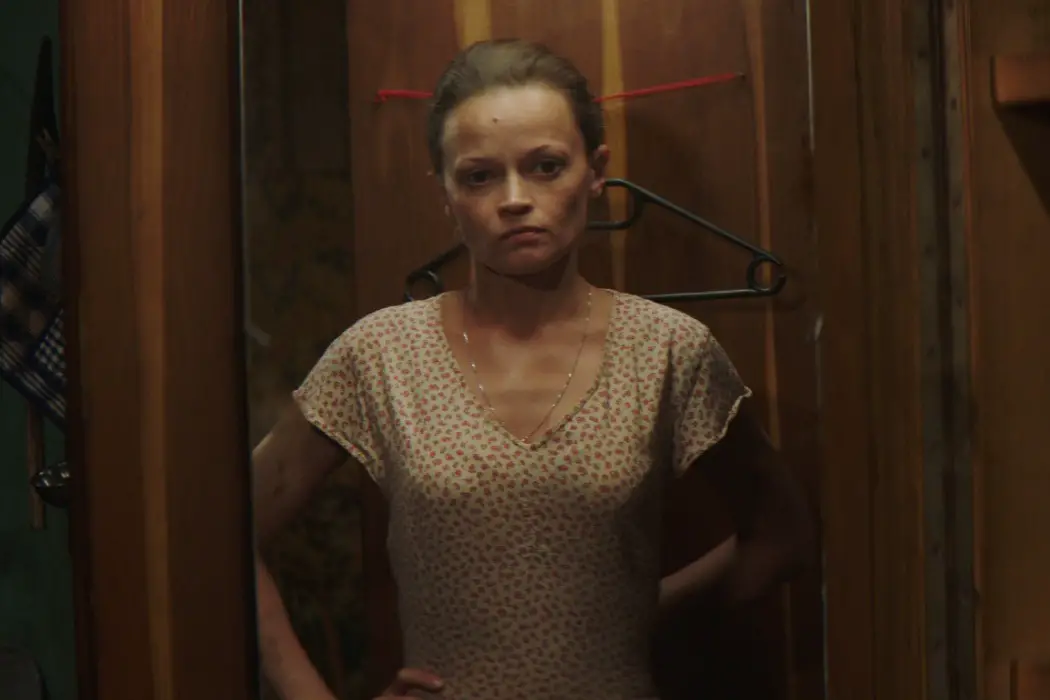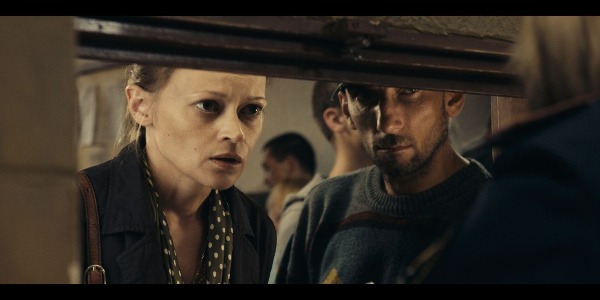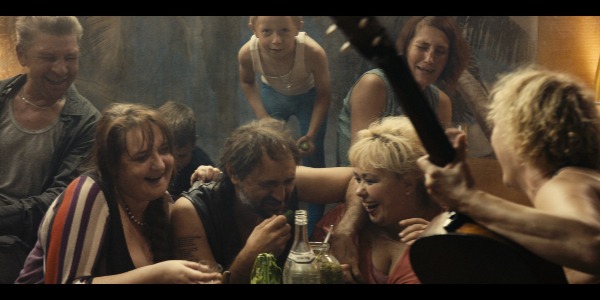A GENTLE CREATURE: A Mean-Spirited Look At Corruption In Russian Society

Alistair is a 25 year old writer based in Cambridge.…
In the age of Film Twitter, when hot takes about every new release movie can be unleashed every other second, it’s very rare to find a film that can be definitively described as “divisive” – where opinion is split down the middle so thoroughly, there’s no room for any thoughts from the middle ground.
Sergei Loznitsa’s A Gentle Creature is one such film, premiering at last year’s Cannes Film Festival to a chorus of boos during the screening, a vocally disruptive reaction that only intensified with the further twists and turns his film takes.
Gilliam’s Brazil, Relocated to Putin’s Russia
Named after a Dostoyevsky short story to which it bears little resemblance, Loznitsa’s film is a miniature epic taking aim at the bureaucracy of Putin’s authoritarian Russia by telling the story of one woman who merely wants to send a package to her incarcerated husband. Starting off as a bleak domestic drama with the same precise socio-political rage as the works of Loveless director Andrey Zvyagintsev, the film slowly becomes something a lot stranger.
This is a dark, surreal effort that has more than a faint echo of Terry Gilliam’s Brazil in its examination of a quasi-dystopia where human rights abuses are obfuscated through mountains of paperwork. And yet, as we get deeper in to this conspiracy, the film grows increasingly uninterested in solving any of the questions it raises.
Taking several narrative turns that, with the mystery removed from the equation, only add up to leave a bad taste in the mouth. As A Gentle Creature removes itself slowly from anything approaching a believable reality, the end product ends up feeling more like hysterical Russophobia towards the country’s populace as a whole, rather than a coherent condemnation of the country’s authoritarian rule.

The story is initially effective in its simplicity. An unnamed woman in a remote Russian village (Vasilina Makovtseva) heads to the post office to find the parcel she sent her husband in prison has been returned with no explanation. Attempting to find the truth, she makes the journey down to the remote Siberian village where the imposing prison is located in order to hand the package over directly. Again, authorities turn her away with no explanation – leaving her to rely on the locals of the village to try help find the answer as to what exactly has happened to her husband.
The film is initially rewarding in its depiction of the woman’s journey. Loznitsa ensures she is in every scene, yet regularly disappears from the frame altogether in order to eavesdrop on the conversations happening around her, ranging from the inane (“they eat snails over in shitty France”), to the more thematically relevant. Loznitsa isn’t exactly subtle, as people have political discussions ranging from Russia’s nuclear arsenal and how it can blow up mainland America, to how human rights activists are fascists – a populace effected by the Kremlin’s far right propaganda to the extent they’ve lost all sight of their humanity.
Punching Down Instead of Punching Up
Unfortunately, it isn’t long before the film gets mean-spirited, offering grotesque stereotypes of Russians instead of continuing to mock the things they’ve been brainwashed into believing. At the Russian village, she stays with a gaggle of overweight women and a boorish, heavy drinking man coercing everybody present into games of strip poker while casually groping them. These exaggerated depictions of the working classes as heartless monsters with low IQ’s feel like the Eastern European equivalent of Sacha Baron Cohen’s depictions of the working class in his execrable Grimsby.

As we visit more people in the village, it begins to feel like Loznitsa is punching down at the people of Russia, instead of punching up at the system that has led them to this state; an overseas intellectual (Loznitsa hails from Ukraine) caricaturing an entire country’s citizens as overweight, violent and devoid of basic human empathy, from an elitist ivory tower.
Putin’s government is more than worthy of criticism, but the director keeps losing sight of his intended target to caricature the helpless cogs in a machine who have been brainwashed into thinking they’re free. Vasilina Makovtseva’s performance eventually becomes the sole element holding the film together – her unflinching presence is largely silent and reactive, never smiling, yet allowing her expressionless face to say more about the horrors surrounding her than even the overwrought screenplay is able to.
As the film reaches its third act, it abandons any pretensions towards realism with an extended narrative detour that’s the justifiable cause for the chorus of boos that erupted at its Cannes premiere. The Gilliam-inspired inflections of the earlier narrative turn into full blown homage here, taking a baffling turn that furthers the heightened thesis on the corrupt nature of Russian society, before leading to an ill-advised (not to mention lazy) narrative cop-out that instantly removes the sense of intrigue the film rediscovered at the eleventh hour.
A Gentle Creature: Conclusion
A Gentle Creature is too overblown with its anti-Russia stance, consistently missing the intended target of the country’s suffocating bureaucracy in order to portray ordinary Russians as being as corrupt as those in charge. T
he heightened portrayal of Russian communities feels like the sort of thing a Hollywood studio would produce during the “Red Scare” moral panics of the eighties – and yet, as the relationship between Russia and the West deteriorates once again, Loznitsa’s film still feels too exaggerated in its commentary to feel like a realistic condemnation.
A Gentle Creature is released in the UK on April 13. All international release dates are here.
Does content like this matter to you?
Become a Member and support film journalism. Unlock access to all of Film Inquiry`s great articles. Join a community of like-minded readers who are passionate about cinema - get access to our private members Network, give back to independent filmmakers, and more.
Alistair is a 25 year old writer based in Cambridge. He has been writing about film since the start of 2014, and in addition to Film Inquiry, regularly contributes to Gay Essential and The Digital Fix, with additional bylines in Film Stories, the BFI and Vague Visages. Because of his work for Film Inquiry, he is a recognised member of GALECA, the Gay & Lesbian Entertainment Critics' Association.













